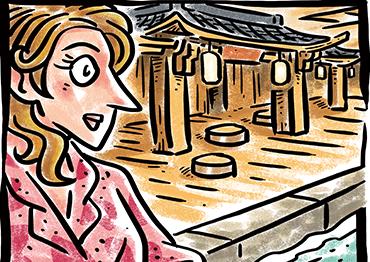All expats in China have bad days. Days when the language barrier gets to you, or days when you question your decision to come to a strange faraway land with customs and requirements that you find taxing and irksome. Some days, lounging at home isn’t enough to relieve your tense muscles and weary mind. In times of dire need for some real leisure, for me, nothing is better than a trip to a Korean-styled bathhouse or spa. It might come as a surprise, but in some cities, these adapted versions of their Korean counterparts are quite commonplace. For three and half years, I had the pleasure of living in the seaside metropolis of Qingdao, on the coast of East China, where there are a plethora of clean and affordable bathhouses to frequent whenever the winter’s chill bites too sharply, or life just gets too bitter for one reason or another. A bit north of Qingdao is a small town renowned for its natural hot springs called Jimo. Visitors come from near and far to bathe in high salt content waters found there to treat their rheumatic diseases. The most popular destination in that quaint but beautiful city is probably Ocean Springs, a resort located right up against the beach. Gazing out from the dozens upon dozens of indoor and outdoor pools, bathers get a stunning view of the glittering sea and neatly spaced tall rocky islands and outcroppings on the horizon. Ocean Springs even allows guests the opportunity to stay overnight for a minor fee.
Like other Northeastern Chinese cities, Qingdao has a high concentration of foreigners. Most of them hail from South Korea and Japan, both having rich bathhouse cultures of their own going back for thousands of years. Most relevant to the businesses in Qingdao is the well-loved Korean establishment, the “jjimjilbang.” These places are sex-segregated spas offering hot tubs, showers, saunas, and much more. Going to a jjimjilbang is often a family event. Male and female family members separate to partake in the naked activities of the establishment before reconvening in the co-ed public areas. All guests usually don the establishment’s complimentary pajamas for a few hours of tea, food, foot massages, spa treatments, private movie screenings, or simple family hangout time on padded foam mats with thin blankets. Some establishments in Qingdao are even themed to resemble a pastoral Japanese or Korean bathhouse, with large wooden huts and indoor trees to pay homage to these iconic traditional cultures.
But my favorite place to spend a few hours or even an overnight stay is an enormous six-story spa in Qingdao which offers almost everything someone could want to relax, and is universally popular with Chinese and South Koreans. Upon arrival, you’re met with a calming scent and soft music. The staff gives everyone a red wrist band with a sensor, which they use to keep track of what you buy. This is done to avoid needing to carry your wallet or your phone around with you. I never visited that spa without feeling like royalty. Someone calm and patient was always there to guide me in the right direction. Best of all, not a single staff member ever made me feel pressured to buy something I didn’t want in the first place, which I find is a real rarity in China, no matter what kind of business you are visiting. Unlike Korean spas, Chinese spas offer much the same services for a fraction of the price. It’s difficult to hate life when getting a US$10 manicure and pedicure on heated marble floors, following your US$15 dollar hour-long hot stone massage.
There are so many different treatments and massages to try, everything from traditional Chinese medicinal treatments to getting your knots worked out by blind masseuses. Generally, if you aren’t a Chinese speaker, it is best to walk into such situations with a few key phrases, such as learning to say “not so hard” or “a bit harder please.” While it is quite nice to enjoy the delights of the second to sixth floors, the real value to me are the basement level beauty treatments you can have alongside the nude pools, such as honey masks, almond oil massages and salt scrubs.
If you are in proximity to one of these establishments and you haven’t yet tried them out, you’re missing out on something phenomenal. Just five minutes soaking in some fragrant medicinal water is enough to melt away most stresses, and to remind you that slowing down to take care of your body is an essential part of a balanced lifestyle.

 Old Version
Old Version